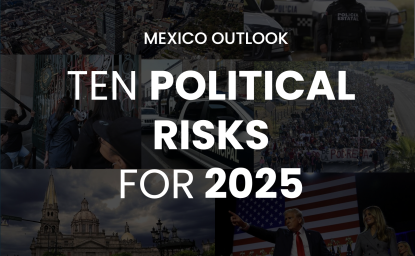
Background: On February 5, 2024, President López Obrador proposed an electoral reform targeting Mexico’s National Electoral Institute (INE) and Congressional structure to allegedly combat corruption and promote government austerity. The proposal, however, has sparked serious concerns as it could fundamentally alter Mexico’s democratic processes and marginalize minority representation and pluralism, potentially paving the way for a return to one-party rule. This reform, expected to be debated by the new Congress in September before Sheinbaum takes office on October 1, would also have significant implications for U.S. and private sector interests.
Current Electoral System Composition: Mexico’s Congress consists of an Upper Chamber (Senate) and a Lower Chamber (Chamber of Deputies) and uses a mixed-member electoral system. The Chamber of Deputies has 500 members: 300 elected by majority and 200 by proportional representation. The Senate has 128 members: 64 elected by majority and 64 by proportional representation. On the other hand, the National Electoral Institute (INE) oversees federal, state, and local elections, ensuring they are free, fair, and democratic. Established as an impartial body independent of political parties, the INE aims to maintain transparency and legality in Mexico’s electoral process.
Reform Proposals: Main Intended Changes
- Eliminating the INE: The INE and the 32 local electoral institutes (OPLES) would be replaced by one institution: the National Institute of Elections and Consultation (INEC).
- Election of electoral counselors by popular vote: Councilors of the new electoral institute and magistrates of the Federal Electoral Tribunal (TEPJF) would be elected by popular vote during national elections every six years. These officials would be selected from a list of 30 candidates, with three candidates proposed by each branch of government, who will have to campaign for the position.
- Congressional composition restructure: Eliminating all 200 deputies and 64 senators elected by proportional representation.
Will the reform safeguard democracy? No. The INE is one of the most efficient and globally recognized electoral institutions, emerging from a history of severe electoral manipulation by the former dominant party, the Institutional Revolutionary Party (PRI). The proposed reform intends to eliminate the proportional representation system (PR), which was introduced to ensure minority-party representation and prevent single-party dominance resulting from the PRI’s 71-year uninterrupted rule. While the current system has flaws, experts have suggested reforms to enhance seat distribution and democratize party structures rather than eliminate PR to ensure authentic representation.
Consequences for Mexico and the US-MX bilateral relationship
- Political Agenda Dominance: New electoral institutions will likely prioritize political, private, or criminal interests over democratic, legal, and technical objectives.
- Electoral Tribunal Control: Controlling the electoral tribunal could skew electoral disputes and litigation in favor of the ruling party, risking non-recognition of unfavorable electoral victories.
- Democratic Erosion: Weakening the INE as a counterweight to presidential power threatens free elections and democratic governance. The reform might increase the risk of political manipulation, stifling the progress that has been accomplished since 1988 to ensure free and fair elections.
- Political Imbalance: Removing PR will exclude political minorities and remove legislative oversight, which could lead to presidential overreach and a lack of political and democratic balance, potentially leading to a return to a single-party system. Democratic processes and political diversity would be undermined, and Mexico's democracy would be diminished, as pluralism would be weakened and legislative monopolies could prevail.
The content discussed is based on the original proposals presented by President López Obrador in February of this year.
The reforms will be discussed by the newly elected Congress starting September 1, so the proposals' contents may change.
Author

Explore More
Browse Insights & Analysis
Imamoglu’s Arrest Sparks Nationwide Unrest and Raises Fears for Turkish Democracy


